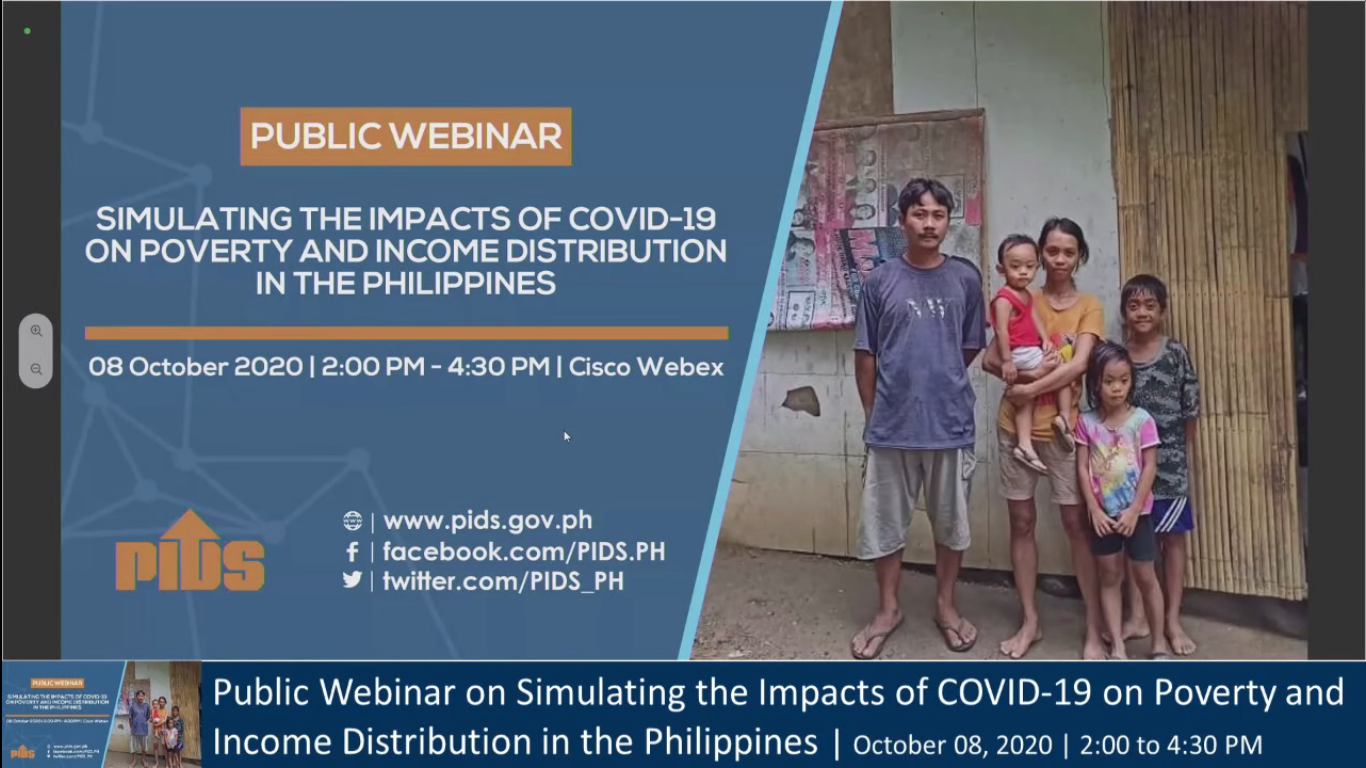PROPOSALS to adjust the personal income tax regime appear “well justified” but necessitate new tax measures to offset losses to the treasury, according to a discussion paper from the Philippine Institute for Development Studies (PIDS).
In her preliminary study Comparative Assessment of Proposals to Amend the Personal Income Tax Law released this month, PIDS Senior Research Fellow Rosario G. Manasan evaluated five different tax reform measures proposed during the 16th Congress and the proposal of the Tax Management Association of the Philippines (TMAP).
Ms. Manasan said the proposal -- Senate Bill (SB) No. 716, SB 1942, SB 2149, House Bill (HB) 4829, HB 5401 and the TMAP version -- tackle the need for eliminating the “bracket creep” and easing the tax burden of Filipinos relative to their peers in the Association of Southeast Asian Nations (ASEAN).
Senator Ralph G. Recto’s SB 716 and Marikina City 2nd District Rep. Romero Federico S. Quimbo’s HB 4829 seek to adjust the tax brackets based on changes in the consumer price index between 1998 and 2015 without changing the current basic rate structure.
Meanwhile, Senators Paolo Benigno A. Aquino IV (SB 1942) and Juan Edgardo M. Angara (SB 2149), Bayan Muna party-list Representatives Neri J. Colmenares and Carlos Isagani T. Zarate (HB 5401) along with TMAP proposed to adjust current rates by setting thresholds for taxable income and amending the top marginal rate.
The government last reformed the country’s income tax regime in 1997. Accordingly, individuals whose incomes have since risen along with inflation pay higher taxes simply because their taxable income entered the next income bracket.
Also, current tax rates are among the highest in the ASEAN region. At 32%, the highest personal income tax rate in the Philippines is second only to the 35% imposed in Thailand and Vietnam, according to the discussion paper.
In terms of progressivity, the proposals were assessed positively although SB 2149 and HB 4829 turned out less progressive than the current rate structure, Ms. Manasan said.
The study showed that tax liability under Mr. Angara’s proposal actually increases for individuals in the lower bracket during the first two years of implementation, while Mr. Quimbo’s bill increases tax for non-wage taxpayers earning less than P500,000.
“As for losses in government revenue, the costliest bills are Quimbo’s HB 5892 and Colmenares and Zarate’s HB 5401, which is estimated at P130 billion and P232 billion, respectively,” PIDS quoted Ms. Manasan in a statement e-mailed yesterday.
“In contrast, Recto’s SB 216 will result in a revenue loss of around P52 billion for the government while Angara’s SB 2149 will cost the government P10 billion in the first year and P61 billion in lost revenues for the third and final year,” she added.
The study conducted for state think tank PIDS highlighted the need for the government to offset lost revenue arising from adjustments to the current income tax regime.
The government has the option to increase the value-added tax (VAT) rate, Ms. Manasan said, noting that adjusting the current 12% by 1 percentage point would allow for the recovery of around P26.25 billion of lost revenues.
But raising the VAT rate could negate the increased purchasing power resulting from the modification of the personal income tax rate schedule, especially among the poorer segment of the population.
“Increasing the VAT will only recover revenue loss to a certain point, assuming that the increase in disposable income is fully spent. Moreover, the poorest will remain the hardest hit if the price of goods increases proportional to the VAT,” Ms. Manasan said.
In this light, the PIDS research fellow presented another option: levy an excise tax on sugar-sweetened beverages, which could generate an additional P30 billion for the government annually, based on the Finance department’s estimate.
Alternatively, the government can apply an additional variable excise tax rate on petroleum products or increase the road user’s tax and motor vehicle user charge. Aside from augmenting state funds, both measures will have a positive impact on the environment through reduced pollution and congestion, Ms. Manasan noted.
Meanwhile, former TMAP President Rina Manuel noted during a seminar sponsored by the Philippine Senate the estimated billions in losses will be a “real price to pay,” according to the PIDS statement.
Apart from putting compensatory measures in place, Ms. Manuel said sustaining the government’s revenue stream also depends on improving its collection system and establishing a “specialized tax payer program” for the self-employed and professionals.
With about two months left before the national elections, Ms. Manasan said: “I think our candidates should make a stand on this issue so that voters know what they are voting for.”//
In her preliminary study Comparative Assessment of Proposals to Amend the Personal Income Tax Law released this month, PIDS Senior Research Fellow Rosario G. Manasan evaluated five different tax reform measures proposed during the 16th Congress and the proposal of the Tax Management Association of the Philippines (TMAP).
Ms. Manasan said the proposal -- Senate Bill (SB) No. 716, SB 1942, SB 2149, House Bill (HB) 4829, HB 5401 and the TMAP version -- tackle the need for eliminating the “bracket creep” and easing the tax burden of Filipinos relative to their peers in the Association of Southeast Asian Nations (ASEAN).
Senator Ralph G. Recto’s SB 716 and Marikina City 2nd District Rep. Romero Federico S. Quimbo’s HB 4829 seek to adjust the tax brackets based on changes in the consumer price index between 1998 and 2015 without changing the current basic rate structure.
Meanwhile, Senators Paolo Benigno A. Aquino IV (SB 1942) and Juan Edgardo M. Angara (SB 2149), Bayan Muna party-list Representatives Neri J. Colmenares and Carlos Isagani T. Zarate (HB 5401) along with TMAP proposed to adjust current rates by setting thresholds for taxable income and amending the top marginal rate.
The government last reformed the country’s income tax regime in 1997. Accordingly, individuals whose incomes have since risen along with inflation pay higher taxes simply because their taxable income entered the next income bracket.
Also, current tax rates are among the highest in the ASEAN region. At 32%, the highest personal income tax rate in the Philippines is second only to the 35% imposed in Thailand and Vietnam, according to the discussion paper.
In terms of progressivity, the proposals were assessed positively although SB 2149 and HB 4829 turned out less progressive than the current rate structure, Ms. Manasan said.
The study showed that tax liability under Mr. Angara’s proposal actually increases for individuals in the lower bracket during the first two years of implementation, while Mr. Quimbo’s bill increases tax for non-wage taxpayers earning less than P500,000.
“As for losses in government revenue, the costliest bills are Quimbo’s HB 5892 and Colmenares and Zarate’s HB 5401, which is estimated at P130 billion and P232 billion, respectively,” PIDS quoted Ms. Manasan in a statement e-mailed yesterday.
“In contrast, Recto’s SB 216 will result in a revenue loss of around P52 billion for the government while Angara’s SB 2149 will cost the government P10 billion in the first year and P61 billion in lost revenues for the third and final year,” she added.
The study conducted for state think tank PIDS highlighted the need for the government to offset lost revenue arising from adjustments to the current income tax regime.
The government has the option to increase the value-added tax (VAT) rate, Ms. Manasan said, noting that adjusting the current 12% by 1 percentage point would allow for the recovery of around P26.25 billion of lost revenues.
But raising the VAT rate could negate the increased purchasing power resulting from the modification of the personal income tax rate schedule, especially among the poorer segment of the population.
“Increasing the VAT will only recover revenue loss to a certain point, assuming that the increase in disposable income is fully spent. Moreover, the poorest will remain the hardest hit if the price of goods increases proportional to the VAT,” Ms. Manasan said.
In this light, the PIDS research fellow presented another option: levy an excise tax on sugar-sweetened beverages, which could generate an additional P30 billion for the government annually, based on the Finance department’s estimate.
Alternatively, the government can apply an additional variable excise tax rate on petroleum products or increase the road user’s tax and motor vehicle user charge. Aside from augmenting state funds, both measures will have a positive impact on the environment through reduced pollution and congestion, Ms. Manasan noted.
Meanwhile, former TMAP President Rina Manuel noted during a seminar sponsored by the Philippine Senate the estimated billions in losses will be a “real price to pay,” according to the PIDS statement.
Apart from putting compensatory measures in place, Ms. Manuel said sustaining the government’s revenue stream also depends on improving its collection system and establishing a “specialized tax payer program” for the self-employed and professionals.
With about two months left before the national elections, Ms. Manasan said: “I think our candidates should make a stand on this issue so that voters know what they are voting for.”//












